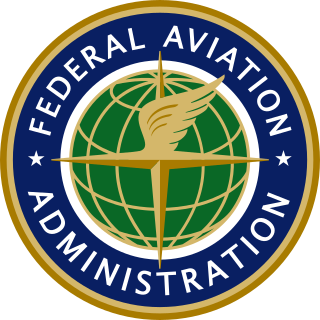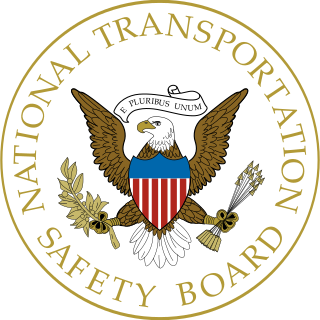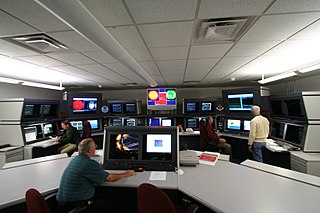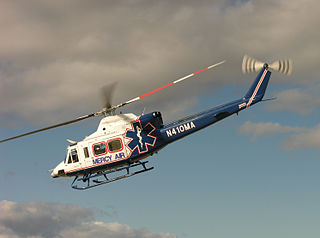
The Federal Aviation Administration (FAA) is the largest transportation agency of the U.S. government and regulates all aspects of civil aviation in the country as well as over surrounding international waters. Its powers include air traffic control, certification of personnel and aircraft, setting standards for airports, and protection of U.S. assets during the launch or re-entry of commercial space vehicles. Powers over neighboring international waters were delegated to the FAA by authority of the International Civil Aviation Organization.

The National Transportation Safety Board (NTSB) is an independent U.S. government investigative agency responsible for civil transportation accident investigation. In this role, the NTSB investigates and reports on aviation accidents and incidents, certain types of highway crashes, ship and marine accidents, pipeline incidents, bridge failures, and railroad accidents. The NTSB is also in charge of investigating cases of hazardous materials releases that occur during transportation. The agency is based in Washington, D.C. It has four regional offices, located in Anchorage, Alaska; Denver, Colorado; Ashburn, Virginia; and Seattle, Washington. The agency also operates a national training center at its Ashburn facility.
The Federal Advisory Committee Act (FACA), is a United States federal law which governs the behavior of federal advisory committees. In particular, it has special emphasis on open meetings, chartering, public involvement, and reporting. The U.S. General Services Administration (GSA) oversees the process.
The Air Commerce Act of 1926 created an Aeronautic Branch of the United States Department of Commerce. Its functions included testing and licensing of pilots, certification of aircraft and investigation of accidents.

A fixed-base operator (FBO) is an organization granted the right by an airport to operate at the airport and provide aeronautical services such as fueling, hangaring, tie-down and parking, aircraft rental, aircraft maintenance, flight instruction, and similar services. In common practice, an FBO is the primary provider of support services to general aviation operators at a public-use airport and is on land leased from the airport, or, in rare cases, adjacent property as a "through the fence operation". In many smaller airports serving general aviation in remote or modest communities, the town itself may provide fuel services and operate a basic FBO facility. Most FBOs doing business at airports of high to moderate traffic volume are non-governmental organizations, either privately or publicly held companies.

The Office of Commercial Space Transportation is the branch of the United States Federal Aviation Administration (FAA) that approves any commercial rocket launch operations — that is, any launches that are not classified as model, amateur, or "by and for the government" — in the case of a U.S. launch operator and/or a launch from the U.S.

The Space Weather Prediction Center (SWPC), named the Space Environment Center (SEC) until 2007, is a laboratory and service center of the US National Weather Service (NWS), part of the National Oceanic and Atmospheric Administration (NOAA), located in Boulder, Colorado. SWPC continually monitors and forecasts Earth's space environment, providing solar-terrestrial information. SWPC is the official source of space weather alerts and warnings for the United States.

Jane F. Garvey is a former government transportation and public works official, now an American business executive, currently serving as the chairman of Meridiam North America. She was the first female Administrator of the U.S. Federal Aviation Administration from 1997 to 2002. In May 2018, she was tapped to become the first female Chairman of United Continental Holdings.

Trusten Allan McArtor was the Administrator of the U.S. Federal Aviation Administration from 1987 to 1989.

A commercial astronaut is a person who has commanded, piloted, or served as an active crew member of a privately funded spacecraft. This is distinct from an otherwise non-government astronaut, for example Charlie Walker, who flies while representing a non-government corporation but with funding or training or both coming from government sources.

Sensitive security information or SSI is a term used in the United States to denote sensitive but unclassified information obtained or developed in the conduct of security activities, the public disclosure of which would constitute an unwarranted invasion of privacy, reveal trade secrets or privileged or confidential information, or be detrimental to the security of transportation. It is not a form of classification under Executive Order 12958 as amended. SSI is not a security classification for national security information. The safeguarding and sharing of SSI is governed by Title 49 Code of Federal Regulations (CFR) parts 15 and 1520. This designation is assigned to information to limit the exposure of the information to only those individuals that "need to know" in order to participate in or oversee the protection of the nation's transportation system. Those with a need to know can include persons outside of TSA, such as airport operators, aircraft operators, railroad carriers, rail hazardous materials shippers and receivers, vessel and maritime port owners and operators, foreign vessel owners, and other persons.

The safety of emergency medical services flights has become a topic of public interest in the United States, with the expansion of emergency medical services aviation operations, such as air ambulance and MEDEVAC, and the increasing frequency of related accidents.
The Subcommittee on Aviation is a subcommittee within the House Transportation and Infrastructure Committee.
The Next Generation Air Transportation System (NextGen) is an ongoing United States Federal Aviation Administration (FAA) project to modernize the National Airspace System (NAS). The FAA began work on NextGen improvements in 2007 and plans to finish the final implementation segment by 2030. The goals of the modernization include using new technologies and procedures to increase the safety, efficiency, capacity, access, flexibility, predictability, and resilience of the NAS while reducing the environmental impact of aviation.

Amanda Renae Simpson is an American pilot, businesswoman and politician.
Pan American Flight 103 blew up over Lockerbie, Scotland, on December 21, 1988. 243 passengers, 16 crew members, and 11 people on the ground were killed by the explosion. It was the second most disastrous passenger airline explosion up to that time. By the next day, experts found enough evidence to declare the explosion to have been caused by sabotage. Within days intelligence sources reported an anonymous telephone call to the United States embassy in Helsinki, Finland, on December 5, 1988, warned of possible sabotage on the flight.
Title 51 of the United States Code, entitled National and Commercial Space Programs, is the compilation of the general laws regarding space programs. It was promulgated by U.S. President Barack Obama on December 18, 2010 when he signed PL 111-314 into law.
NASA Alumni League is a U.S. organization that supports people that have worked for or at NASA or its predecessor NACA, to stay connected, and to "support the nation's space programs with technical expertise, educational outreach, and financial contributions to STEM organizations." The organization operates across the nation, also with state chapters that allow patrons to network locally. Three goals of NAL in the early 21st century were to "communicate with the NASA community", "to aid the NASA community with its comprehension of engineering and science, and "encourage members to participate in community service and in turn, encourage a dedication to the pursuit of scientific knowledge that benefits all humankind. " NAL is not part of NASA or the U.S. government, it is a non-profit organization founded in 1986.

Patricia Grace Smith was a United States Federal Aviation Administration (FAA) associate administrator whose regulatory work helped make personal space travel a possibility.

The Aviation Innovation, Reform, and Reauthorization (AIRR) Act was a bill introduced on February 3, 2016, in the 114th Congress (2015-2016) by Congressman Bill Shuster (R-PA) and Frank LoBiondo (R-NJ). Among other things, the bill would have privatized the American air traffic control (ATC) system. The bill would also have reauthorized the Federal Aviation Administration (FAA) through 2019.












